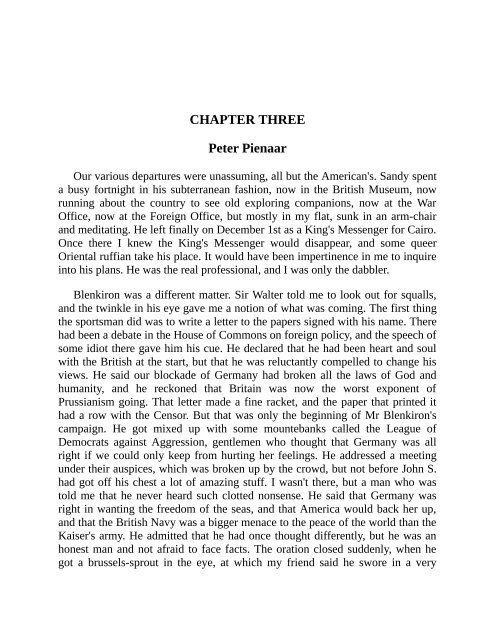Greenmantle - John Buchan
Greenmantle es la segunda de las cinco novelas de John Buchan con el personaje de Richard Hannay , publicado por primera vez en 1916 por Hodder & Stoughton , Londres . Es una de las dos novelas de Hannay ambientadas durante la Primera Guerra Mundial , la otra es el Sr. Standfast (1919); La primera y más conocida aventura de Hannay, The Thirty-Nine Steps (1915), se desarrolla en el período inmediatamente anterior a la guerra.
Greenmantle es la segunda de las cinco novelas de John Buchan con el personaje de Richard Hannay , publicado por primera vez en 1916 por Hodder & Stoughton , Londres . Es una de las dos novelas de Hannay ambientadas durante la Primera Guerra Mundial , la otra es el Sr. Standfast (1919); La primera y más conocida aventura de Hannay, The Thirty-Nine Steps (1915), se desarrolla en el período inmediatamente anterior a la guerra.
Create successful ePaper yourself
Turn your PDF publications into a flip-book with our unique Google optimized e-Paper software.
CHAPTER THREE<br />
Peter Pienaar<br />
Our various departures were unassuming, all but the American's. Sandy spent<br />
a busy fortnight in his subterranean fashion, now in the British Museum, now<br />
running about the country to see old exploring companions, now at the War<br />
Office, now at the Foreign Office, but mostly in my flat, sunk in an arm-chair<br />
and meditating. He left finally on December 1st as a King's Messenger for Cairo.<br />
Once there I knew the King's Messenger would disappear, and some queer<br />
Oriental ruffian take his place. It would have been impertinence in me to inquire<br />
into his plans. He was the real professional, and I was only the dabbler.<br />
Blenkiron was a different matter. Sir Walter told me to look out for squalls,<br />
and the twinkle in his eye gave me a notion of what was coming. The first thing<br />
the sportsman did was to write a letter to the papers signed with his name. There<br />
had been a debate in the House of Commons on foreign policy, and the speech of<br />
some idiot there gave him his cue. He declared that he had been heart and soul<br />
with the British at the start, but that he was reluctantly compelled to change his<br />
views. He said our blockade of Germany had broken all the laws of God and<br />
humanity, and he reckoned that Britain was now the worst exponent of<br />
Prussianism going. That letter made a fine racket, and the paper that printed it<br />
had a row with the Censor. But that was only the beginning of Mr Blenkiron's<br />
campaign. He got mixed up with some mountebanks called the League of<br />
Democrats against Aggression, gentlemen who thought that Germany was all<br />
right if we could only keep from hurting her feelings. He addressed a meeting<br />
under their auspices, which was broken up by the crowd, but not before <strong>John</strong> S.<br />
had got off his chest a lot of amazing stuff. I wasn't there, but a man who was<br />
told me that he never heard such clotted nonsense. He said that Germany was<br />
right in wanting the freedom of the seas, and that America would back her up,<br />
and that the British Navy was a bigger menace to the peace of the world than the<br />
Kaiser's army. He admitted that he had once thought differently, but he was an<br />
honest man and not afraid to face facts. The oration closed suddenly, when he<br />
got a brussels-sprout in the eye, at which my friend said he swore in a very














